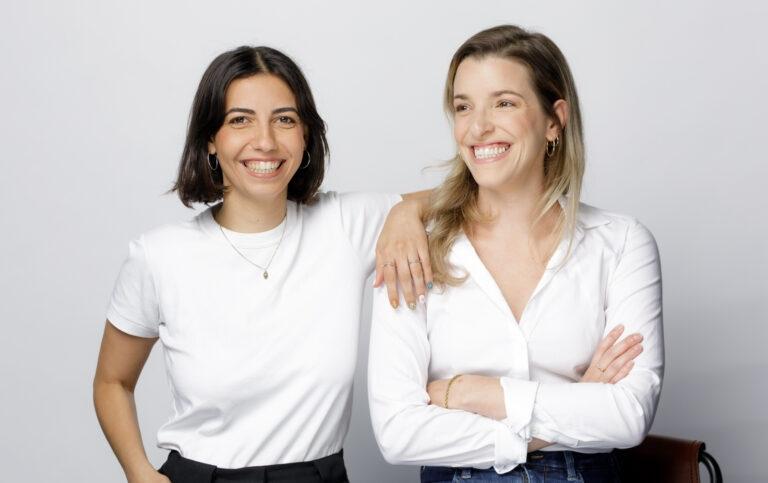Happy Things cofounders Noa Fenigstein, left, and Talia Soen. Photo by Omer Hacohen
The app that can teach you happiness
Happy Things, based on positive psychology research, encourages users to take simple, everyday action to increase happiness in an attainable way.
Happiness, apparently, is not some faraway abstract concept. Instead, it’s a skill, or even like a muscle that needs regular workouts to stay in shape.
This is the premise of an Israeli startup’s app that guides users in taking small daily actions to improve their overall happiness.
Happy Things, says cofounder and CEO Talia Soen, is the product of her own pursuit of happiness.
“I had this feeling that I’m not happy enough and that something is missing in my life, and I kept on searching for ways and solutions for a happier life,” she shares with ISRAEL21c.
“I came across the methodology of positive psychology, a relatively new school of psychology, that’s unlike more classic schools focusing on the negative and helping people get back to what’s considered the norm,” she explains.
“Positive psychology looks at it the other way round – what makes people happier, what makes their lives better, what helps us flourish, what we can learn from people who are happy and the ways in which we can apply it to the general public.”
Thousands of research studies have shown that happiness is not something we’re born with, nor is it external or a byproduct of our achievements, she adds. It’s something that can be strengthened with practice.
“I tried this methodology on myself and found out that like anything that you try and turn into a habit, it’s difficult to do without an external framework that helps you out.
“Happy Things is a digital framework that teaches people how to practice and provides them with a tool to do so in a daily basis. It’s a bit like Duolingo, just for happiness.”
Focusing on women
Soen and her cofounder and CMO, Noa Fenigstein, work with a team of freelance experts in a variety of fields, and have raised funds from Fusion, an Israeli VC and accelerator, as well as from angel investors and family offices.
Founded in 2021 and targeted to the United States, Happy Things already has 1,200 paying users.
“In October, because of the war, we opened the app for free to anyone in Israel, and now we offer a month free for people here [in Israel], and continue to offer all types of things locally,” Soen says.
“At the moment the app is aimed at everyone, but most of our users are women, so we’re going to take it places that are suitable for women,” she adds.
“Our platform takes thousands of pieces of research and turns them into short, easy activities. These can be practiced in five minutes a day, on the go, without needing to plan ahead,” she explains.
“These can include anything from listening to a song that brings up a happy memory, complimenting someone or calling a friend you haven’t spoken to in a while, to going on 10-minute walk or thinking about three good things that happened this week.”
The more data the app collects, the more personalized it will become, Soen notes.
“That way, it will be able to provide users what’s best for them in terms of preferences, family situation, hormonal status, work schedule and lots of things that the system will be able to take into account.”
Getting to know you
This personalization capability is powered by AI mechanisms that the company is developing, for example to take into account what actions you’ve already taken on the app, how you rated them, and what day and time you did them.
“Further down the line, it will also know to take into account external parameters like your calendar, the health kit on your phone, and how well you slept. We’ll know how to tailor activities that will boost your energies, or, if we know that you have a busy day, we’ll be able to offer you activities that will provide you with a break,” she adds.
Users report that they enjoy the variety the app has to offer, the surprise element of the daily activity and the fact that it’s easy to use on the go. Soen says people are using the app three to five times a week on average, and there’s high retention.
“Research shows that when people are happier, it’s not only about how they feel. They also become healthier and contribute more to society. There’s a ripple effect,” she points out.
“People sometimes think that ‘If I’ll be healthy, I’ll be happy,’ or ‘If I’ll be successful, I’ll be happy.’ But research shows that it’s the other way around. Happiness begins with us, and it contributes to us being healthy, more successful and in better relationships. Our goal is to help as many people as possible around the world live better, healthier lives.”
Simple things
Soen offers a few tips for Israelis experiencing months of war.
“Israel is ranked one of the happiest countries in the world,” she notes. “It’s not an easy place to live, but we’re defined as very happy people.”
One of the contributing factors is resilience.
“The fact that we need to bounce back all the time is a big contributor to happiness. Also, there’s community and family. Relationships and support are very strong here. Vitamin D is also an important contributor to happiness, as is a Mediterranean diet.”
Soen says it’s important to do “little, simple things that take only a few minutes a day that can contribute to our wellbeing. We can look at photos that make us smile, look outside and observe something beautiful, or call up a friend and ask how they’re doing. It’s awareness to the little things that is so important for our happiness.”
